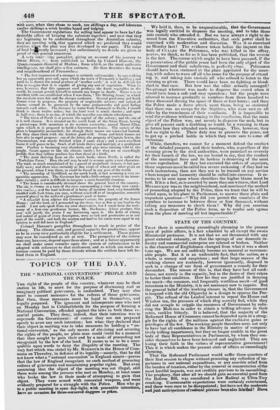TOPICS OF THE DAY.
THE "NATIONAL- CONVENTIONS" PEOPLE AND • THE POLICE.
THE right of the people of this country, whatever may be their station in life, to meet for the purpose of discussing real or imaginary political grievances, is undoubted. They may also meet to concert measures for the redress of those grievances. But then, those measures must be legal in themselves, and legally prepared. The' ignorant and intemperate men who met on Monday last in Coldbathlields for the purpose of forming a National Convention, offended against the laws in both these es- sential points. They deny, indeed, that their intention was to supersede the Government : of course they are not prepared openly to avow any such intention; but when they declared that their object in meeting was to take measures for holding a "na- tional convention," as the only means of obtaining and securing the rights of the people, no plain man could doubt for a moment that they sought to gain their end by a mode of proceeding not recognized by the law of.the 'land. It seems to us to be a mere quibble upon.words to deny the illegality of the -meeting. The very fact which was stated by Mr. ROEBUCK in the House of Com- mons on Thursday, in defence of its legality—namely, that he did not know what a " national convention' in England meant—proves that the law. of England recognizes no such method of. procuring redress of grievances and maintaining popular rights. But even assuming . that the' object of the' meeting was not illegal, still there were among the persons who met on Monday, at least some who broke the .law in their mode of attempting to gain that object. They were armed with concealed -weapons, and went evidently prepared for a struggle with the Police. Men who go to a public meeting in open day-light; with-peaceable intentions, have no occasion.kr three-cornered-daggers or-pikes. We hold it, then, to be unquestionable, that the Government ' was legally entitled to 'disperse the meeting, and to take those into custody who atteuded it. • But we have alwaya a right tede- ; mend from the Executive authorities, that such power -shall be ; exercised with moderation and discretion. Was it so exercised on Monday last? The evidence taken before the inquest on the • body of Cluta.ns, the Policeman, who was killed in the affray, pioves, we think, as far as it has been published, that the reverse is the fact. The course which ought to have been purstied,if the is preservation, of the public peace had been the only object of the Government and their subalterns, is perfectly clear. Policemen should have been stationed at the place appointed for the meet- ! ing, with orders to warn off all who came for the purpose of attend ing it, and taking into custody all who refused- to listen to the warning so given. There would have been no fighting or blood- shed in that ease. But how was the affair, actually managed? Noatterupt whatever was made to disperse the crowd when it would have been a safe and easy. operation ; but the people were allowed to increase gradually in numbers from three hundred to three thousand during the space of three or four hours; and then the Police made a fierce attack upon' them, being so stationed that there was no escape for the fugitives, who were met on all sides by the truncheons of their assailants. it is impossible to read the evidence without coming to the conclusion, that the main object of the Police was, not merely to disperse the mob, but to give all present such a drubbing as would, be a warning to them in future how they attended such meetings. This, however, they had no right to do. Their duty was to preserve the peace, not to get up a pitched battle in which they were sure to come -off victorious.
While, therefore, we cannot for a moment defend the conduct of the deluded paupers, and their leaders, who, regardless of the warning given by the civil authorities, were punished so severely for their breach of the law, we are bound to say, that the conduct of the municipal force and its leaders is deserving of the most severe reprobation. If they but executed the orders of superiors, those' superiors must be called to a severe reckoning : if they had no such instructions, then are they not to be trusted on any service n-here temper and humanity should be called into exercise. It re- mains to be seen upon whose shoulders the higher blame must be laid. If it is a fact, as is asserted by more than one witness, that Lord MELBOURNE was in the neighbourhood, and sanctioned the method of proceeding adopted by the Police, then we trust -that be will be called upon, in his place in Parliament, to answer these plain and important questions—" Why did you permit the numbers of the populace to increase to between three or four thousand, without taking any Measures to check them ? Why did you sanction such a disposition of the Police force, as to render :safe egress from the place of meeting all but`impracticable?" .
















 Previous page
Previous page